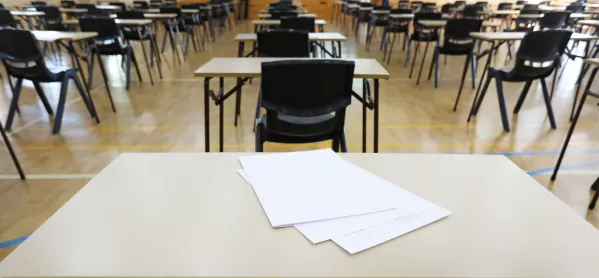GCSEs 2022: League tables ‘unfair’ despite DfE changes

It is “hugely disappointing” that school performance tables are being published this year, despite the changes made to them being “a step in the right direction”, school leaders said today.
The Department for Education announced last year that it would publish qualification results on the Compare School and College Performance website, after suspending this two years due to the disruption caused by the Covid pandemic.
The decision has come under intense scrutiny from heads, with Association of School and College Leaders’ (ASCL) president Pepe Di’Iasio saying that schools were being “thrown to the wolves” in a speech earlier this year.
- Exclusive: Call for league table probe after Covid disruption
- GCSE league tables: ‘Schools thrown to the wolves’
- GCSEs: The ‘value’ of DfE league tables under scrutiny
The DfE has said that it will make changes to the website to “reduce the emphasis on comparison” and “discourage simplistic conclusions”.
But Geoff Barton, general secretary of the ASCL, said the decision to publish the tables at all - despite the changes - is “hugely disappointing”, adding that the move has an “inherent flaw” because the Covid pandemic has affected schools to a different extent.
GCSE league tables: schools affected by Covid ‘to a different extent’
The DfE said that it would be carrying out further work and testing over the coming months on exactly how the changes will work, but that they will include:
- Removing the “all schools and colleges in England” and local authority comparison tables from the site.
- Changing the name of the website to “reduce the emphasis on comparison between institutions”.
- Stopping displaying pre-pandemic data (2018-19 and earlier) on the school/college pages and moving this data to the usual archive with a link on the website.
- Removing the coloured bandings to “discourage simplistic conclusions” being drawn about a school or college’s overall performance.
The DfE decided not to publish key stage 2 performance tables, based on Sats taken by Year 6 pupils in primary education, for the 2021-22 academic year.
But it has not done the same for KS4, instead saying that it will ensure that messages accompany the published tables to “advise caution when considering the 2021-22 data”.
Responding to the changes today, Mr Barton said he was ”pleased” that the education secretary was taking steps to reduce the “potentially damaging” impact of performance tables on schools and colleges following the Covid pandemic.
But he added: “It is hugely disappointing that he is still intent on publishing this information despite recognising that the data is problematic.”
“The inherent flaw is that the pandemic has hit schools and colleges to vastly differing extents and it follows that performance measures based on exam results will also be affected to differing extents, making this data an unreliable indicator of performance,” he said.
“The changes announced by the DfE to ameliorate this situation are designed to reduce the likelihood of unfair comparisons being made between schools and colleges, which is a step in the right direction, but it will still result in performance data being published for each school and college which will affect public perceptions.”
Mr Barton concluded that it would be “simpler and fairer” to suspend the tables for another year to allow “some sort of return to normality” before returning to the “full barrage of accountability measures”.
Other changes to the performance tables have also been revealed as part of the alterations announced by the DfE.
This year, for the first time, the department will list Attainment 8 scores and the percentage of students achieving grade 5 or above in English and maths GCSE at multi-academy trust level.
Other variables, such as Progress 8 scores, are already include at MAT level.
An Attainment 8 score is the average score obtained by a student for their best 8 GCSE results, whilst Progress 8 compares pupils’ KS4 results to those of other pupils nationally with similar prior attainment.
You need a Tes subscription to read this article
Subscribe now to read this article and get other subscriber-only content:
- Unlimited access to all Tes magazine content
- Exclusive subscriber-only stories
- Award-winning email newsletters
Already a subscriber? Log in
You need a subscription to read this article
Subscribe now to read this article and get other subscriber-only content, including:
- Unlimited access to all Tes magazine content
- Exclusive subscriber-only stories
- Award-winning email newsletters
topics in this article



